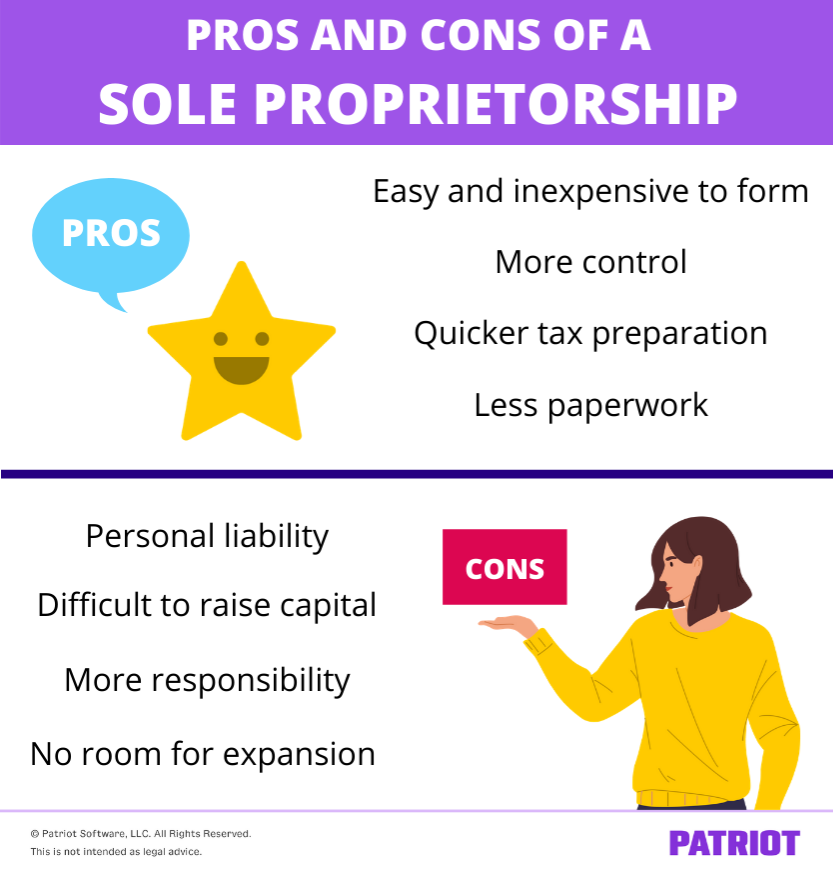A sole proprietorship is the most common type of business structure. A whopping 73% of businesses in the U.S. are sole proprietorships. If you’re considering starting your own venture and forming a sole proprietorship, weigh the pros and cons of a sole proprietorship before making a decision.
Sole proprietorship overview
Before you can learn all about the advantages and disadvantages of sole proprietorship, you have to know a little background information on sole proprietorships.
A sole proprietor is a person who owns and operates their own business. Sole proprietors run their companies by themselves, have complete control, and make all of the decisions for the sole proprietorship.
Sole proprietorship pros and cons
So, you’re thinking about starting a sole proprietorship, eh? Before you run off and become a sole proprietor, weigh the pros and cons of sole proprietorship.
Pros of sole proprietorship
Take a look at some advantages of sole proprietorship below.
1. Easy and inexpensive to form
Part of what makes sole proprietorships so appealing is that, out of all the other types of structures, they’re the easiest to form and manage. Not to mention, sole proprietorships are the least expensive to start up. You don’t have to jump through as many hoops as you would starting a corporation or LLC.
To start your sole proprietorship, simply register your company and apply for any business licenses and permits you might need with your city and state. You may have to pay some small fees, depending on what permits and licenses you need to get.
Becoming a sole proprietor also allows you to test the waters before you expand your business operations. Many partnerships and corporations start out as sole proprietorships and expand later on.
2. More control
Because a sole proprietorship is owned and operated by one individual, one person has complete control of the business. The sole proprietor is the boss and sole decision-maker of the company.
Many individuals become sole proprietors so they can be their own boss and run the business on their own terms.
3. Quicker tax preparation
As a sole proprietor, filing your taxes is generally easier than other business structures. Sole proprietors’ income is taxed as personal income, making it easier to handle come tax time. Business assets and liabilities are not separate because sole proprietorships are not a separate business entity. All you have to do is include your sole proprietorship’s profit and losses and your personal income on your individual income tax return form, Form 1040, U.S. Individual Income Tax Return.
With other business structures, the business entity may have to file its own tax return. And, owners, partners, and stockholders have to file separate tax returns for the income they received from business operations.
4. Less paperwork
Part of a sole proprietorship’s simplicity is the paperwork. Setting up a sole proprietorship requires little paperwork and legal formalities. Other structures, like corporations or partnerships, require you to prepare sets of documents and submit them to several agencies.
With many other business structures, you also have additional paperwork you have to keep track of after you form the business. This could be anything from keeping detailed financial records and statements to filing reports with the state. If you’re a sole proprietor, you don’t have to worry about extra paperwork.
Cons of sole proprietorship
Weigh the disadvantages of sole proprietorship before starting a company by yourself.
1. Personal liability
As a sole proprietor, you’re 100% liable for all of the business debts and obligations. Because a sole proprietorship is not a separate legal entity, all of your personal assets (e.g., house) are linked to the business. There is no separation between the individual and the business in a sole proprietorship.
If something were to happen to your business, you would be held personally liable. For example, if your sole proprietorship runs into financial trouble, creditors can come after your personal assets.
Before you go the sole proprietorship route, consider how much risk you’re willing to take when it comes to your personal assets. If you don’t want to be personally liable for your business, consider a business structure that exists as its own entity (e.g., corporation).
2. Difficult to raise capital
For sole proprietors, it can be more difficult to raise capital or arrange long-term financing because they typically have fewer assets than other types of businesses. Banking institutions and lenders are leery about extending loans or granting funding to sole proprietorships due to lack of assets and stability. Banks and lenders want to ensure the business is capable of repaying the loan and meeting deadlines.
If you’re looking to start a sole proprietorship, you may struggle to raise capital because of your business structure.
3. More responsibility
When you become a sole proprietor, you own and operate your sole proprietorship on your own. Because you’re the one running the show, all of the responsibilities fall onto your lap. Here are a few responsibilities of a sole proprietor:
- Making decisions
- Managing your books
- Handling business taxes
- Running your business
If you get burned out easily or don’t want to take on the responsibility of being a sole proprietor, you may want to consider another structure (e.g., partnership).
4. No room for expansion
One limitation of a sole proprietorship is that there’s little to no room for expansion and growth. With a sole proprietorship, there’s only room for one (aka you). If you want to expand your business in the future (get a partner, find investors, etc.), you need to change your business structure.

How to know if sole proprietorship is the way to go
Along with considering the pros and cons to sole proprietorship, you should also ask yourself the following questions to ensure it’s the right fit for your venture:
- Will I be able to handle 100% of the responsibilities?
- Am I capable of making important decisions?
- Can I deal with the stress of being a sole proprietor?
- Am I comfortable being personally liable?
Keep in mind that if you start out as a sole proprietor, you can always switch to another type of business structure.
Ready to start a sole proprietorship? Here’s what to do…
As you know by now, starting a sole proprietorship is simple. If you’re ready to make the leap and become a sole proprietor, follow the steps below:
- Establish a business name
- Open a business bank account (optional)
- Get a business license
- Apply for state-specific permits
- Obtain other licenses and permits (e.g., health permit if you’re in the food industry)
Don’t waste your precious time running payroll. Use Patriot’s Full Service payroll services instead. With just three simple steps, you can finish payroll in minutes. And, we’ll deposit and file taxes for you. Get your free trial now!
This article is updated from its original publication date of August 7, 2014.
This is not intended as legal advice; for more information, please click here.



